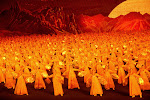Well hello there! Today we answered the following "Essential Questions:"
1) What are the differences and similarities between a direct democracy & republic?
2) What is the main difference between the Roman Republic and the Empire?
3) How did Rome go from the "Roman Republic" to the "Roman Empire?"
To answer #1, we did a Venn diagram comparing the governments of Athens and the Roman Republic. Please see the slide below, and see if you can figure out what the main similarities & differences are. HINT! Do not worry about the actual names of assemblies (like "judicial" and "consul" and "centuriate" etc..) but think more about who is voting and for what they are voting.....
Find them?! This is what we found:
1) BOTH the "direct democracy" and "republic" have the following:
- The people vote for representatives.
- The representatives make laws.
2) DIRECT DEMOCRACY:
- After the representatives make laws, they give them back to the people to vote on them.
3) REPUBLIC:
- After the reps make laws, they show the other reps, who then vote on them themselves.
To answer Essential Question #2, we basically figured that the "Roman Republic" was a democracy in the form of a republic (people rule and are represented in gov't by representatives) and the "Roman Empire" was not a democracy and was ruled by ONE MAN - an emperor!
To answer Essential Question #3, I told the story of Julius Caesar, Cleopatra, and Mark Antony. To learn about this story and the fall of the Roman Republic (to then become the Roman Empire), please look at the slides and videos below... if you have questions, ask me Monday! :o)
So, things are going okay in the Roman Republic.... people are voting for representatives (senate, centuriate assembly, tribal assembly) and the senate picks the consul (like the president). However, Julius Caesar was a powerful army general because he gave land to his poor soldiers... and they love him for this! He became so powerful and popular that he named himself consul (without being voted in) and basically ended the republic because he was now sort of an emperor.
Pompey was a friend of Julius Caesar and a member of the Senate. Pompey wants to kill Caesar, but Caesar chases him to Egypt, where he kills Pompey. HOWEVER, while in Egypt, Caesar hears that the mysterious princess Cleopatra wants to meet him, but he refuses. Cleopatra sneaks in to Caesars room in a very sneaky way (click here to see how) and Caesar is forced to talk to her. He likes Cleopatra very much and agrees to help her become Queen of Egypt (her little brother was pharaoh at this time).
.
.
.
.
.
GIVE Center West - 2595 Beaver Ruin Rd. Norcross, GA 30071 (770-326-8000)
Contact Mr. Kameika:
thomas_kameika@gwinnett.k12.ga.us (Copy + Paste address into your email)
**Puede mandarme mensajes en espanol, si prefiere.
GIVE's Website: GIVE Center West
thomas_kameika@gwinnett.k12.ga.us (Copy + Paste address into your email)
**Puede mandarme mensajes en espanol, si prefiere.
GIVE's Website: GIVE Center West
__________________________________________________________________________
Click on any pictures to watch videos/etc!

WWII prisoners (Poland)

Propaganda (USA)


































